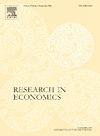Does the Eurozone live in a Minskyan world?
IF 1.2
Q3 ECONOMICS
引用次数: 0
Abstract
The purpose of this paper is to test Minsky's financial instability hypothesis for the Eurozone by focusing on his main conclusion: corporate debt ratios rise during the ascendant phase of the business cycle. Depending on how debt ratios are measured, our results are divided between (i) robust and (ii) imperfect empirical evidence of procyclical debt ratios. Moreover, we suggest that rising interest rates may not be the best policy to avoid a Minskyan process and that alternative measures deserve some attention. We believe these results call for future research.
欧元区生活在明斯基世界中吗?
本文旨在检验明斯基关于欧元区金融不稳定的假说,重点关注其主要结论:企业债务比率在商业周期上升阶段会上升。根据债务比率的衡量方法,我们的研究结果分为(i)有力的和(ii)不完美的债务比率顺周期性的经验证据。此外,我们还提出,提高利率可能不是避免明斯基过程的最佳政策,替代措施值得关注。我们认为这些结果需要未来的研究。
本文章由计算机程序翻译,如有差异,请以英文原文为准。
求助全文
约1分钟内获得全文
求助全文
来源期刊

Research in Economics
ECONOMICS-
CiteScore
1.40
自引率
0.00%
发文量
37
审稿时长
89 days
期刊介绍:
Established in 1947, Research in Economics is one of the oldest general-interest economics journals in the world and the main one among those based in Italy. The purpose of the journal is to select original theoretical and empirical articles that will have high impact on the debate in the social sciences; since 1947, it has published important research contributions on a wide range of topics. A summary of our editorial policy is this: the editors make a preliminary assessment of whether the results of a paper, if correct, are worth publishing. If so one of the associate editors reviews the paper: from the reviewer we expect to learn if the paper is understandable and coherent and - within reasonable bounds - the results are correct. We believe that long lags in publication and multiple demands for revision simply slow scientific progress. Our goal is to provide you a definitive answer within one month of submission. We give the editors one week to judge the overall contribution and if acceptable send your paper to an associate editor. We expect the associate editor to provide a more detailed evaluation within three weeks so that the editors can make a final decision before the month expires. In the (rare) case of a revision we allow four months and in the case of conditional acceptance we allow two months to submit the final version. In both cases we expect a cover letter explaining how you met the requirements. For conditional acceptance the editors will verify that the requirements were met. In the case of revision the original associate editor will do so. If the revision cannot be at least conditionally accepted it is rejected: there is no second revision.
 求助内容:
求助内容: 应助结果提醒方式:
应助结果提醒方式:


